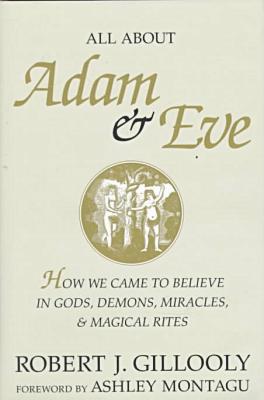
ALL ABOUT ADAM AND EVE
BY ROBERT J. GILLOOLY (PUBLISHED 1998 BY PROMETHEUS BOOKS. ISBN: 1-57392-187-4) 274 pages
The origins of religion and other forms of magical thinking is a fascinating field of study that can tell us much about human nature and our social systems. All About Adam And Eve is a clear and readily accessible volume that explores many of the foundational tenets of religion and its various effects on individuals and on society—all from a rationalistic, humanistic perspective.
Recognizing that many of the beliefs and practices common to the religious world are almost universally shared, author Robert Gillooly takes us on a brief grand tour of the ancient world in order to share with his readers the origins and common roots of the various forms of the supernatural. He discusses the modes of thinking that birthed both the dead religions of antiquity and their more modern spiritual descendants. Most of the conclusions he arrives at will be of little surprise to freethinkers acquainted with the history of religion. For example, Gillooly tells us that, in the absence of the scientific method, the ancients posited gods (and later, one god) as causal explanations for events in nature that were not understood at the time. Adam And Eve is of value in that it is able to distill the various theorems on religion by various authors into one readable account.
This is not to say that there is no new material contained between these covers. Indeed, some of Gillooly’s thoughts can be deceptively simple, and yet engage us into other paths of thinking. For example, in his chapter “Gods of the World—an Overview,” he tells us that: “The invention of gods by the ancients was merely a reflection of the needs which they, as individuals and as a society, perceived as necessary for survival…when the Greeks portrayed their gods as frolicsome, it was a commentary on their own lifestyle—and perhaps a justification.” This is certainly true, and taking the concept further, one becomes aware of a very salient but often overlooked fact about the Bible: Its absolutely humorless nature. The stagnation of the Christian Dark Ages and the general gloominess of life in Christian-dominated countries attests to this anti-enjoyment bias which was woven into the fabric of traditional Christian dogma. The joyless life of the devout Puritans is one of countless examples of this trend. The source? Consider this example: “Woe unto them who laugh” (Luke 6:25). This theme is ubiquitously present throughout the New Testament. Given this, does the misery that Christianity as wrought come as any surprise?
Gillooly’s critique of religion is nonetheless in the best humanistic tradition in its sympathetic consideration of the feelings of those readers who might not share the author’s views; the book is clearly in the rationalist camp. Gillooly dismisses prayer as “wishful thinking.” Then there is his commentary on prophecy:
The credibility of religious prophecy does not rest on the mental state of the prophet, be it aberrant or not, but on the reasonableness of the concept itself. Prophecy first requires a belief in spirits which today’s science does not support. And then, confidence in an ancient prophet who, while in a trance, has a vision seen by him alone. That this is a questionable foundation for enduring religious belief is most apparent, perhaps, in the collection of bull-gods, buffalo-gods, and the thousands of other conjurations which prophecy has produced. (pg.83)
In addition to all this, Gillooly also deals with such topics as asceticism, holy books, prayer, exorcism and the afterlife. The author’s firmly rationalistic approach, to say nothing of his lucidly enjoyable writing style, has proven to be a delight to skeptics.
While much of the material in All About Adam And Eve can be found in other texts, this is still an invaluable book not only because of its synthesized approach to familiar topics, but also because of the author’s unique perspective on this material. Although expensive, it is a most worthwhile addition to any free thought library.
Categories: Book Reviews
